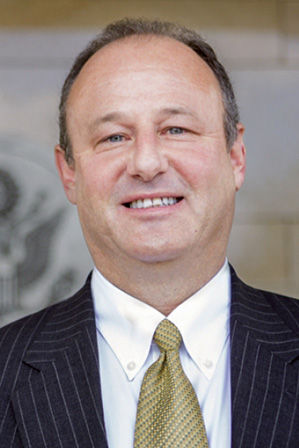Taking Stock and Looking Ahead
President’s Views
BY ERIC RUBIN

As I write this column, we are two months away from November’s elections. By the time you read it, only a month will remain before we and our fellow citizens make choices that have the potential to affect our lives, and those of our children and grandchildren, for many years to come.
I don’t claim to know how the elections will turn out, and I would not even want to try to prognosticate. What I will say is that every one of us, as proud citizens of the United States, must vote. And we must also comply with the Hatch Act that governs political activity of federal employees.
This year has been a year unlike any in recent memory. Historians will debate and assess how we as a country and we as a planet coped with the challenges that came our way, challenges that are ongoing.
For now, though, it is worth taking stock of what we have accomplished as a Service and as an association under trying circumstances. Beginning last fall and continuing into this year, we stood up—as a union and association, as a Service and as patriotic Americans—to support and defend our colleagues who were compelled to participate in the legal process of impeachment.
Just when we thought we had put that crisis behind us, COVID-19 hit and changed everything. The Foreign Service and AFSA have been in battle mode ever since. We’ve all helped support our global community through authorized departure, ordered departure, separation of dependents, medical quarantine and crisis-level staffing shortages.
We’ve worked with the leadership of our agencies to support bringing new members of the Foreign Service on board virtually, an unprecedented experiment that is now paying dividends every time a new class of talented and dedicated Americans joins us.
We’ve faced the national crisis of conscience over fundamental issues of race and ethnicity in America, and its impact on our Service and our agencies. As the September Journal and this edition demonstrate, AFSA is determined to play a role in shaping our response to these challenges and in shaping the Foreign Service of the future.
As this difficult year draws to a close, the unfinished business of bringing the Foreign Service back to the central role in American foreign policy formulation mandated in the Foreign Service Act of 1980 remains. That means having Senate-confirmed senior Foreign Service officers serving as Under Secretaries and Assistant Secretaries, or their equivalents, in all six of the agencies we represent. Right now, among those six agencies there are only two Senate-confirmed FSOs serving at the domestic policymaking level.
Our elected leaders need the advice and contributions of senior career experts before they make critical foreign policy decisions. There is no substitute for experience, and our members collectively bring thousands of years of experience to their jobs every day.
The Senate’s role of advice and consent to senior appointments must also be restored, so that those carrying out the American people’s business have the endorsement and confidence of two branches of government, as the Founders intended.
AFSA will work hard for change in the coming year: more career officers in chief of mission positions, a more diverse and inclusive Service, and more hiring in all the foreign affairs agencies to compensate for years of under-recruitment and a generational challenge in terms of retirement and retention.
AFSA has not always stood firm in defense of our members and our profession in the face of unjustified attacks and discrimination. We stand firm now, and we will continue to do so going forward. It is hard to imagine what 2021 will bring, after the disorienting changes and challenges of 2020. But we will be there for our members and for the essential national institution that is the U.S. Foreign Service.
We count on our members to let us know how we can do better, and to stand together in solidarity as we look ahead to the next set of surprises.

